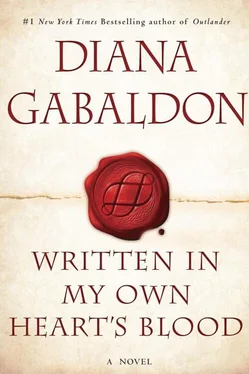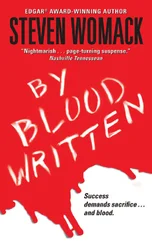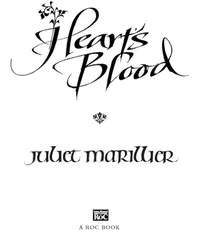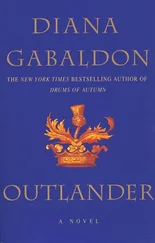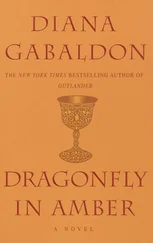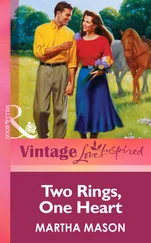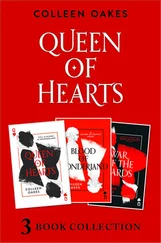“Are you waiting to see General Clinton?” I inquired politely. If he was, I had half a mind to execute a quiet sneak through the house and out of the back door whilst he was ensconced with the general.
“I am,” he replied, adding graciously, “but you must certainly go before me, Lady John. My business will wait.”
That had a mildly sinister ring to it, but I merely inclined my head politely, with a noncommittal “Hmm.”
It was dawning upon me, like an incipient case of indigestion, that my position with regard to the British army in general, and Captain Richardson in particular, was on the verge of a marked reevaluation. Once it became common knowledge that Jamie wasn’t dead—then I was no longer Lady John Grey. I was Mrs. James Fraser again, and while that was certainly cause for ecstatic rejoicing, it also removed any restraint on Captain Richardson’s baser urges.
Before I could think of anything useful to say to the man, a lanky young lieutenant appeared to usher me into the general’s presence. The drawing room, which had been converted to Clinton’s main office, was now in a state of organized disarray, with packing crates lining one wall and bare flagstaffs tied together like a bundle of faggots, the military banners they usually sported being folded briskly into tidy packets by a corporal near the window. I’d heard—the whole city had probably heard—that the British army was withdrawing from Philadelphia. Evidently they were doing so with considerable dispatch.
There were several other soldiers carrying things in and out, but two men were seated, one on either side of the desk.
“Lady John,” Clinton said, looking surprised but rising from his desk and coming to bow over my hand. “Your most obedient servant, ma’am.”
“Good day to you, sir,” I said. My heart had already been beating fast; it speeded up considerably at sight of the man who had risen from his chair and was standing just behind the general. He was in uniform and looked strikingly familiar, but I was sure I’d never seen him before. Who—?
“I am so sorry to have disturbed you, Lady John. I had hoped to surprise your husband,” the general was saying. “But I understand that he is not at home?”
“Er . . . no. He’s not.” The stranger—an infantry colonel, though his uniform seemed to sport even more gold lace than the usual—raised a brow at this. The sudden familiarity of the gesture gave me a slight spinning sensation in the head.
“You’re a relative of Lord John Grey’s,” I blurted, staring at him. He had to be. The man wore his own hair, as John did, though his was dark beneath its powder. The shape of his head—fine-boned and long-skulled—was John’s, and so was the set of his shoulders. His features were much like John’s, too, but his face was deeply weathered and gaunt, marked with harsh lines carved by long duty and the stress of command. I didn’t need the uniform to tell me that he was a lifelong soldier.
He smiled, and his face was suddenly transformed. Apparently he had John’s charm, too.
“You’re most perceptive, madam,” he said, and, stepping forward, smoothly took my limp hand away from the general and kissed it briefly in the continental manner before straightening and eyeing me with interest.
“General Clinton informs me that you are my brother’s wife.”
“Oh,” I said, scrambling to recover my mental bearings. “Then you must be Hal! Er . . . I beg your pardon. I mean, you’re the . . . I’m sorry, I know you’re a duke, but I’m afraid I don’t recall your title, Your Grace.”
“Pardloe,” he said, still holding my hand and smiling at me. “But my Christian name is Harold; do please use it if you like. Welcome to the family, my dear. I had no idea John had married. I understand the event was quite recent?” He spoke with great cordiality, but I was aware of the intense curiosity behind his good manners.
“Ah,” I said noncommittally. “Yes, quite recent.” It hadn’t for an instant occurred to me to wonder whether John had written to tell his family about me, and if he had, they could barely have received the letter by now. I didn’t even know who all the members of his family were —though I had heard about Hal, he being the father of John’s nephew Henry, who—
“Oh, of course, you’ve come to see Henry!” I exclaimed. “He’ll be so pleased to see you! He’s doing very well,” I assured him.
“I have already seen Henry,” the duke assured me in turn. “He speaks with the greatest admiration of your skill in removing pieces of his intestine and reuniting the remnants. Though eager as I naturally was to see my son—and my daughter”—his lips compressed for a moment; apparently Dottie had informed her parents about her engagement—“and delighted as I shall be to meet my brother again, it is actually duty that called me to America. My regiment is newly landed in New York.”
“Oh,” I said. “Er . . . how nice.” John plainly hadn’t known that his brother, let alone his regiment, was coming. It occurred dimly to me that I ought to be asking questions and finding out what I could about the general’s plans, but it didn’t seem the time or place.
The general coughed politely.
“Lady John—do you happen to know the whereabouts of your husband at the moment?”
The shock of meeting Harold, Duke of Pardloe, had quite wiped the reason for my presence out of my mind, but this brought it back with a rush.
“No, I’m afraid I don’t,” I said, as calmly as possible. “I told your corporal. A messenger came a few hours ago, with a note, and Lord John went off with him. He didn’t say where he was going, though.”
The general’s lips twitched.
“Actually,” he said, still polite, “he didn’t. Colonel Graves sent the messenger, with a note informing Lord John of his re-commission and directing him to come here at once. He didn’t.”
“Oh,” I said, sounding as blank as I felt. Under the circumstances, it seemed all right to let that show, and I did. “Dear me. In that case . . . he did go off with someone .”
“But you don’t know with whom?”
“I didn’t see him go,” I said, neatly avoiding the question. “I’m afraid he didn’t leave word as to where he was bound.”
Clinton raised a strongly marked black brow and glanced at Pardloe.
“I suppose in that case he will return shortly,” the duke said with a shrug. “The matter isn’t urgent, after all.”
General Clinton looked as though he differed somewhat with this opinion but, with a brief glance at me, said nothing. He clearly had little time to waste, though, and, bowing politely, bade me good day.
I took my leave with alacrity, barely pausing to assure the duke that I was pleased to have met him and to ask where might his brother send word . . . ?
“I have rooms at the King’s Arms,” Pardloe said. “Shall I—”
“No, no,” I said hurriedly, to forestall his offer to see me home. “It’s quite all right. Thank you, sir.” I bowed to the general, then to Hal, and headed for the door in a whirl of skirts—and emotions.
Captain Richardson was no longer in the foyer, but I hadn’t time to wonder where he had gone. I gave the soldier at the door a quick nod and smile and then was out in the open air, breathing as though I’d just escaped from a bathysphere.
Now what? I wondered, swerving to avoid two little boys with a hoop, who were caroming down the street, bouncing off the legs of the soldiers carrying parcels and furniture to a large wagon. The boys must belong to one of Clinton’s officers, since the soldiers were tolerating them.
John had spoken fairly often of his brother and had remarked upon Hal’s tendency toward ruthless high-handedness. All the current situation needed was a nosey parker with a taste for authority mixing in. I wondered briefly whether William was on good terms with his uncle; if so, perhaps Hal could be diverted and put to good use in talking sense to—no, no, of course not. Hal mustn’t know—yet at least—about Jamie, and he couldn’t exchange two words with Willie without finding out—if William would talk about it, but then—
Читать дальше
